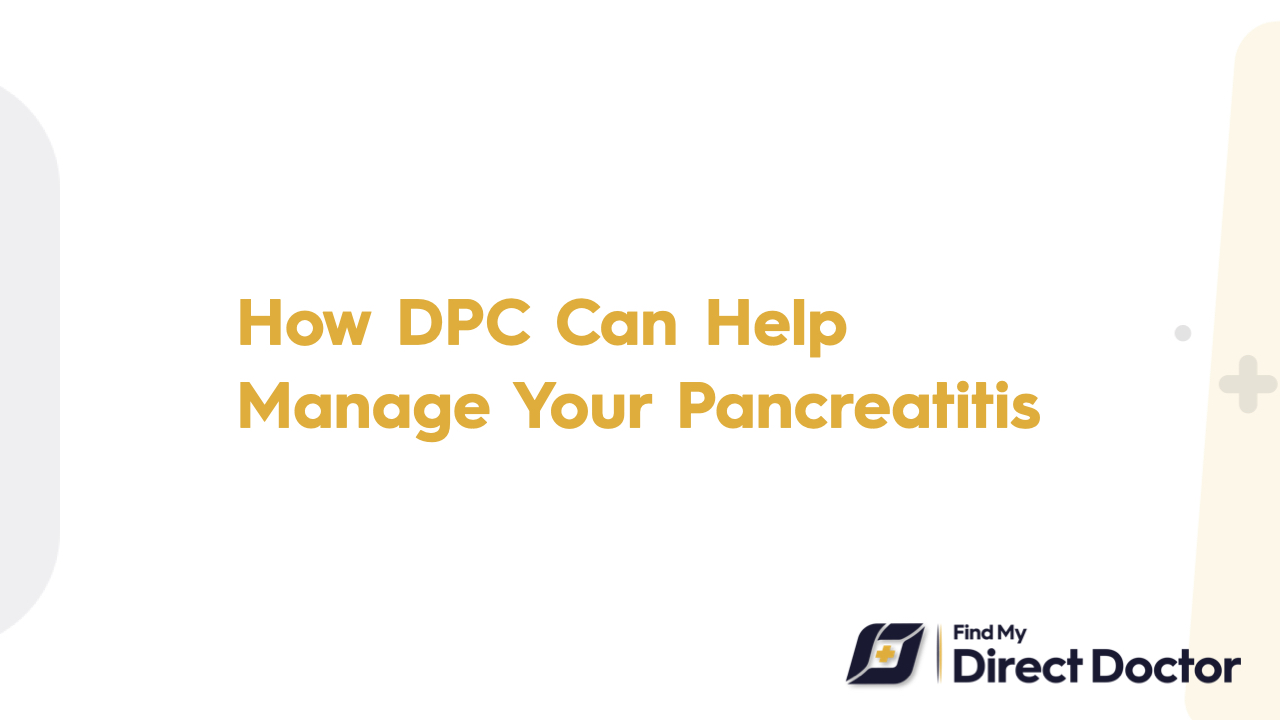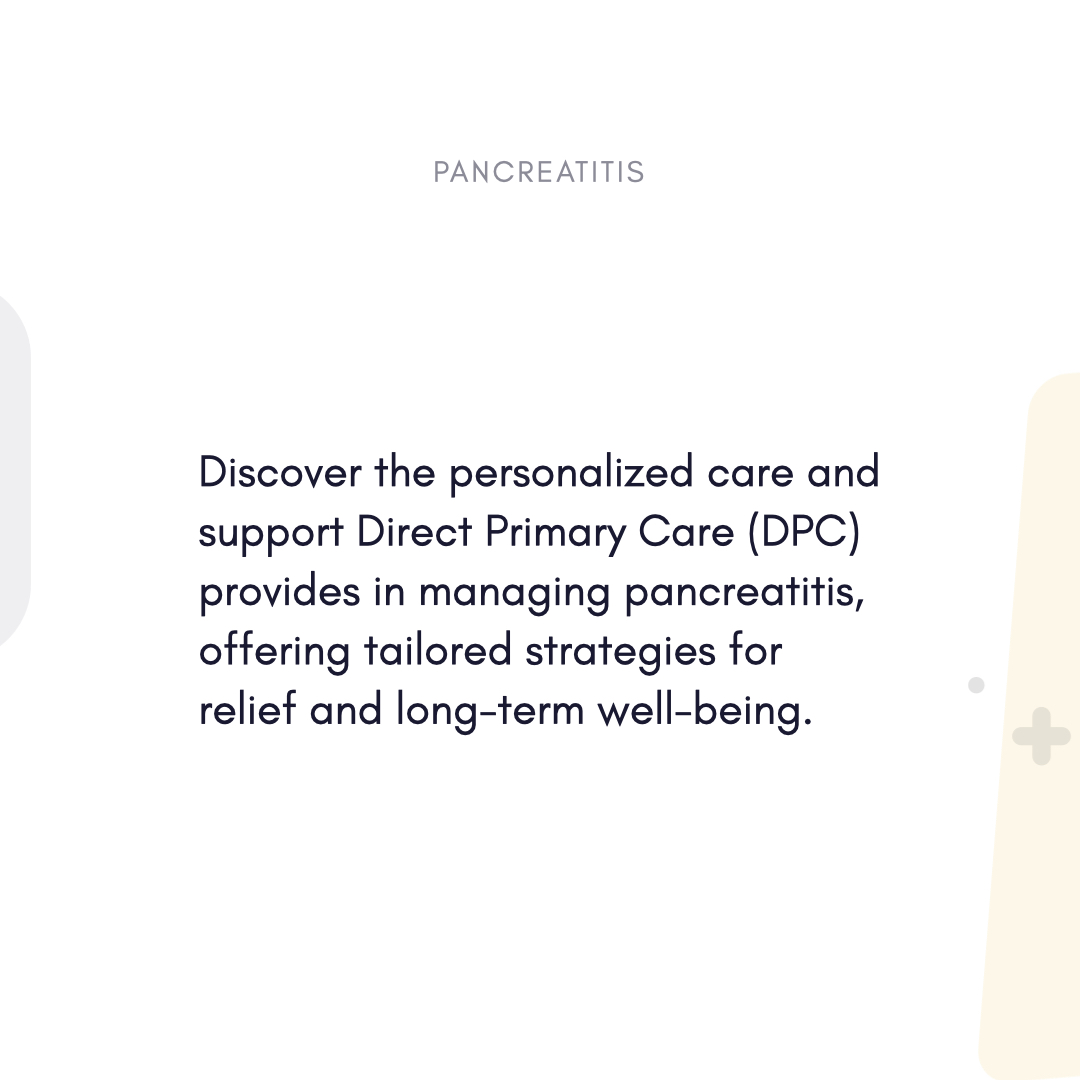Pancreatitis and Direct Primary Care (DPC): Personalized Care for Pain Relief and Long-Term Health
An ache of burning radiating back. Nausea not going to go away. For more than 275,000 Americans hospitalized annually with pancreatitis, this inflammation of the pancreas disrupts life and demands careful treatment. Typical problems in conventional medicine are scattered follow-ups, delayed specialist referrals, and outrageous costs. Still, there is hope since direct primary care (DPC) presents patient-centered, proactive treatment to aggressively treat pancreatitis.

Understanding Pancreatitis
Pancreas inflammation known as acute, or sudden, pancreatitis can also be chronic, or long-term. Gallstones, alcohol abuse, or genetic causes abound. Typical signs include:
- Severe top stomach pain
- Vomiting and stomach problems
- In acute forms, fever or a rapid pulse
- In chronic forms, weight loss and oily bowel movements
Effects of untreated or uncontrolled pancreatitis over long terms:
- Diabetes brought on by damaged cells making insulin
- Malnutrition results from ineffective nutrient absorption.
- Dependency on opioids and ongoing suffering
Early intervention and multidisciplinary treatment are stressed by the American College of Gastroenterology (ACG) as means of avoiding complications.
DPC Transforms: Pancreatitis Management Made Right
Usually running on a membership model, Direct Primary Care (DPC) offers unlimited access to your doctor for a set price. For those with pancreatitis, this means no co-pays, no insurance delays, and a care plan exactly fit your need.
1. Early Detection and Continuous Monitoring
For suspected flare-ups or sudden stomach pain, the readily available DPC model guarantees same-day assessments.
- Bargained for reasonably priced imaging: CT scans, MRCPs, or endoscopic ultrasounds.
- Lab access covers lipase/amylase tests, vitamin D, B12, and HbA1c monitoring as well as nutritional panels.
2. Customized, Guideline-Driven Treatment
DPC doctors create personalized plans including: using ACG guidelines including:
- Pain management calls for step-up plans combining NSAIDs, neuromodulators (gabapentin), and antioxidants like curcumin.
- Nutritional support comes from pancreatic enzyme replacement therapy (PERT) for malabsorption plus custom low-fat meal plans.
- Part of lifestyle programs are stress-reducing techniques and programs for alcohol and smoking cessation.
3. All-Around, Fairly Affordable Help
DPC reduces drug prices to lower both financial and emotional load.
- Wholesale pricing for Creon's enzymes or compounded painkillers.
- 24/7 telehealth support helps to control flares at home, so preventing ER visits.
- Integration of mental health: therapy for anxiety or depression related to ongoing suffering.
DPC's Benefits for Pancreatitis Sufferers
1. Attachability Unmatched
- 24/7 text/phone access for acute problems including sudden pain spikes.
- Not waiting for GI specialist or pain clinic recommendations.
2. Individualized Treatment Strategies
- Early ERCP for gallstone-related cases or genetic testing for hereditary pancreatitis corresponds ACG-wise.
- Dietary recommendations and regular glucose monitoring help to maintain pancreatic function by means of diabetes prevention.
3. Open Reasonably Affordable Cost
- Typical savings: from co-pay stacks, ER visits, and imaging mark-ups avoidance, 2,000+ USD annually.
- Membership includes management of chronic diseases, care coordination, and consultations.
Personal Stories of Success from Real Life
- David, 42, had alcohol-induced chronic pancreatitis and cycled through ERs for pain relief. His DPC physician linked him with a sobriety coach, created a personalized PERT schedule, and set up discounted acupuncture. For eighteen months he is flare-free.
- Case 2: Maria, 55, battled malnutrition following repeated acute attacks. Her DPC provider guaranteed cash-pay rates for endoscopic treatment, created a high-calorie meal plan, ordered genetic testing exposing an SPINK1 mutation, She dropped fifteen pounds and manages pain without turning to opioids.
Ask Questions on DPC and Pancreatitis.
- Can DPC handle an emergency involving severe acute pancreatitis?
- A: Certain. Often at discounted self-pay rates, DPC doctors triage symptoms right away, schedule urgent imaging, and, if needed, coordinate ICU transfers.
- For long-term enzyme replacement therapy, DPC makes sense.
- A: Exactly. Members save forty to sixty percent on Creon or Zenpep by using wholesale pharmacy relationships.
- What if I need a specialist like a gastroenterologist?
- A: Working with top local experts, a DPC physician ensures discounted cash rates and efficient reference tracking.
Why DPC Helps Those Having Pancreatitis?
Stressing their congruence with ACG guidelines, the American Academy of Family Physicians supports DPC.
- Early intervention and lifestyle counseling help to reduce flare frequency.
- Tools for tracking symptoms, underline diet, and help you avoid triggers empower you.
- Trust: Transactional, piecemeal treatment is replaced by a long-standing patient-physician relationship.
Regulate Your Pancreatic Condition: Get Back In Control
Pancreatitis need not be a lifetime of suffering and hospital visits. DPC guides you toward a partner who pays close attention, responds fast, and gets you ready to bloom every day.






